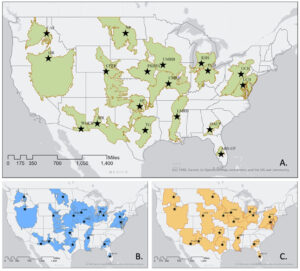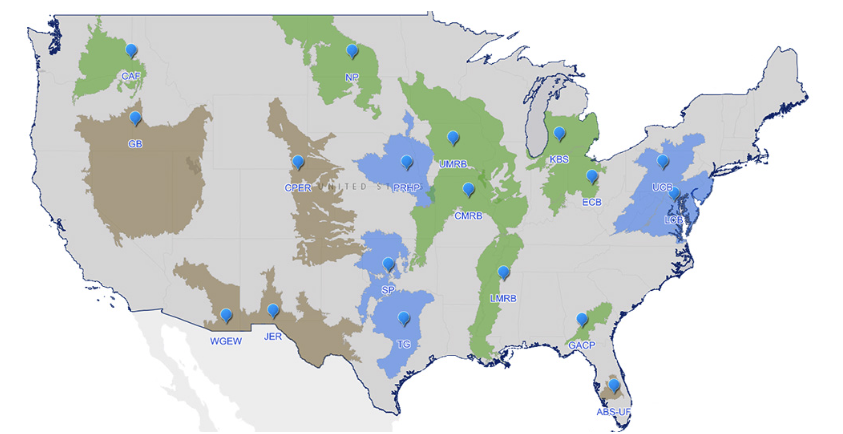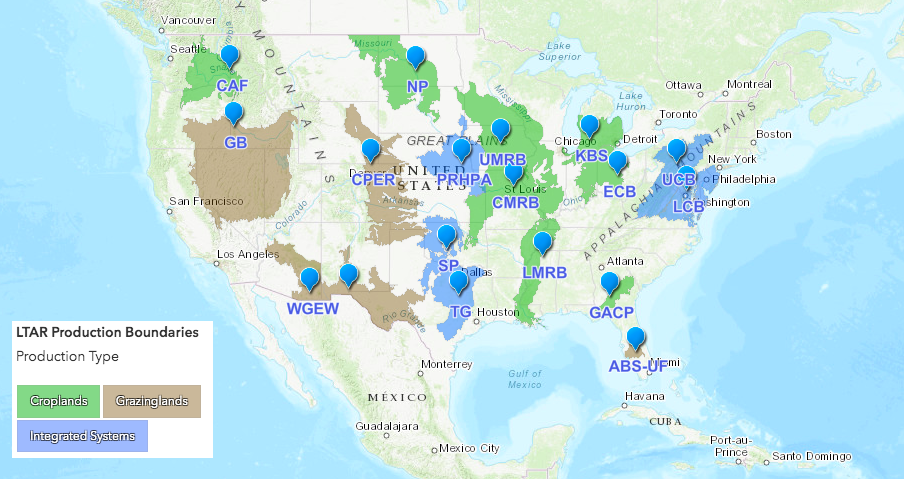Working Group: Regionalization
What is a Region?

Maps of current Long-Term Agroecosystem Research (LTAR) agroecoregions. (A) Production Boundaries; (B) Environment Boundaries; and (C) Rural Prosperity Boundaries. (Bean, et al. Regional Frameworks for the USDA Long-Term Agroecosystem Research Network; Alisa, et al. Long-Term Agroecosystem Research Network regions, 2018 version.)
A region is a spatial area that has some distinctive characteristics or features that set it apart from other regions. Regions can be defined by various criteria, such as biophysical, socioeconomic, or administrative factors. Regions can help researchers and stakeholders compare and extrapolate data and findings across different locations and scales.
Purpose
The Regionalization Working Group is a team of geospatial scientists and experts from the Long-Term Agroecosystem Research (LTAR) Network. The purpose of the working group is to develop a consistent and coherent spatial framework for the LTAR Network, based on the domains of production, environmental impact, and rural prosperity, which includes society and economics. The working group also identifies and maps indicators that can characterize the LTAR regions and facilitate cross-site synthesis and integration.
History
The Regionalization Working Group was initiated in 2017, in response to the need for a standardized and repeatable method to describe the geographic extent of agricultural landscapes represented by each LTAR site. The working group held its first workshop in March 2018, in Tifton, GA, where it defined new sets of regional boundaries for LTAR sites and mapped and compared indicators from each domain. The working group also documented the rationale and methods used to derive the regions and indicators.
Current efforts (2023)
The working group is currently updating and refining the regional boundaries and indicators, incorporating new data and changing conditions. The working group is also developing methods and tools to assess the uncertainty and validity of extrapolating results from experimental plots and fields to larger regions. The working group is also collaborating with other LTAR projects and networks to share and harmonize data and information.
References
Publications from the Regionalization Working Group:
- Kumar, J., Coffin, A. W., Baffaut, C., Ponce-Campos, G. E., Witthaus, L., & Hargrove, W. W. (2023). Quantitative Representativeness and Constituency of the Long-Term Agroecosystem Research Network and Analysis of Complementarity with Existing Ecological Networks. In Environmental Management (Vol. 72, Issue 4, pp. 705–726). Springer Science and Business Media LLC. https://doi.org/10.1007/s00267-023-01834-9
- Bean, A. R., Coffin, A. W., Arthur, D. K., Baffaut, C., Holifield Collins, C., Goslee, S. C., Ponce-Campos, G. E., Sclater, V. L., Strickland, T. C., & Yasarer, L. M. (2021). Regional Frameworks for the USDA Long-Term Agroecosystem Research Network. In Frontiers in Sustainable Food Systems (Vol. 4). Frontiers Media SA. https://doi.org/10.3389/fsufs.2020.612785
Datasets
The working group produces and maintains a dataset describing the regional boundaries for the LTAR Network, “Long-Term Agroecosystem Research Network regions, 2018 version,” archived in the USDA National Agricultural Library’s Ag Data Commons repository. The working group also produces and maintains a dataset describing the indicators for the LTAR Network, “Long-Term Agroecosystem Research Network indicators, 2018 version,” also archived in the Ag Data Commons repository. These datasets are publicly available and can be accessed and downloaded by researchers and stakeholders.
Related Work
- “Tracking Change Across North America” Story Map is a product from the Resilience Working Group.
- “Your Environment is Changing. But how it changes is up to you.” Story Map by the Commission of Environmental Cooperation
Recent Press
Contact
Alisa Coffin: alisa.coffin@usda.gov
Katie Pisarello: katie.pisarello@usda.gov
Guillermo Ponce-Campos: geponce@email.arizona.edu
Gerardo Armendariz: gerardo.armendariz@usda.gov
ABOUT LTAR
The USDA Agricultural Research Service (ARS) Long-Term Agroecosystem Research network consists of 18 Federal and university agricultural research sites with an average of over 50 years of history. The goal of this research network is to ensure sustained crop and livestock production and ecosystem services from agroecosystems, and to forecast and verify the effects of environmental trends, public policies, and emerging technologies.
LINKS
ABOUT LTAR
The USDA Agricultural Research Service (ARS) Long-Term Agroecosystem Research network consists of 18 Federal and university agricultural research sites with an average of over 50 years of history. The goal of this research network is to ensure sustained crop and livestock production and ecosystem services from agroecosystems, and to forecast and verify the effects of environmental trends, public policies, and emerging technologies.


